
Nanango is a rural town and locality in the South Burnett Region, Queensland, Australia. In the 2016 census, the locality of Nanango had a population of 3,599 people.

Cloncurry Courthouse is a heritage-listed courthouse at 42-48 Daintree Street, Cloncurry, Shire of Cloncurry, Queensland, Australia. It was designed by Department of Public Works (Queensland) and built in 1897 by Murray and Litster. It is also known as Cloncurry Court House. It was added to the Queensland Heritage Register on 21 October 1992.
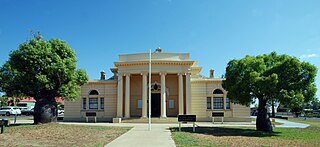
Roma Courthouse is a heritage-listed courthouse at 141 McDowall Street, Roma, Maranoa Region, Queensland, Australia. Constructed in 1901, the courthouse is a rendered masonry building, which is still in use today. Predominately influenced by the Federation free style, it is considered a stunning example of Federation colonial architecture at its best. It is also known as Roma Court House and Roma Police Buildings. It was added to the Queensland Heritage Register on 7 August 1998.

Innisfail Court House is a heritage-listed court house at 10 Edith Street, Innisfail, Cassowary Coast Region, Queensland, Australia. It is the town’s third court house. It was designed in the inter-war classical style by the Department of Public Works (Queensland) and built in 1939 by day labour. The current court house is a two-storeyed brick building with a corrugated-iron roof. It was added to the Queensland Heritage Register on 13 January 1995.

Cardwell Bush Telegraph is a heritage-listed former post office and now heritage centre at 53 Victoria Street, Cardwell, Cassowary Coast Region, Queensland, Australia. The Telegraph and Post Office at Cardwell was designed by Colonial Architect's Office and built in 1870 by George McCallum, making it one of the oldest buildings in North Queensland.

Old Bishopsbourne is a heritage-listed house at 233 Milton Road, Milton, City of Brisbane, Queensland, Australia. It was designed by Benjamin Backhouse and built from 1865 to 1959. It is also known as St Francis Theological College and Bishopsbourne. It was added to the Queensland Heritage Register on 21 October 1992.

Rosewood Courthouse is a heritage-listed courthouse at 1 John Street, Rosewood, City of Ipswich, Queensland, Australia. It was built from 1908 to 1923. It is also known as Rosewood police residence. It was added to the Queensland Heritage Register on 6 June 1994.

Gympie Lands Office is a heritage-listed former court house and public administration building at 26 Channon Street, Gympie, Queensland, Australia. It was designed by Queensland Department of Public Works and Queensland Colonial Architect's Office and built in 1942 by the Department of Public Works, Gympie City Council, Mark Doggett, Andrew Collins, and George Caldwell. It was added to the Queensland Heritage Register on 15 July 2011.

Bundaberg Police Station is a heritage-listed former court house (1882–1958) and former police station (1958–1997) at Quay Street, Bundaberg Central, Bundaberg, Bundaberg Region, Queensland, Australia. It was built from 1882 to 1958. It is also known as Bundaberg Court House. It was added to the Queensland Heritage Register on 1 December 1998.
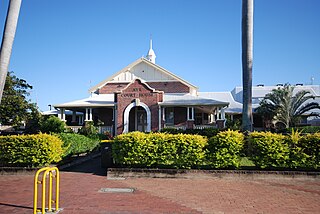
Ayr Court House is a heritage-listed courthouse at 163 Queen Street, Ayr, Shire of Burdekin, Queensland, Australia. It was designed by Douglas Francis Woodcraft Roberts and built from 1935 to 1941 by day labour. It was added to the Queensland Heritage Register on 13 January 1995.
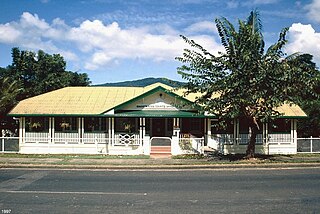
Tully Court House is a heritage-listed courthouse at 46 Bryant Street, Tully, Cassowary Coast Region, Queensland, Australia. It was designed by Nigel Laman Thomas of the Department of Public Works (Queensland) and built from 1941 to 1945. It was added to the Queensland Heritage Register on 24 September 1999.

Cairns Court House Complex is a heritage-listed site incorporating a former courthouse and a former public administration building at 38–40 Abbott Street, Cairns City, Cairns, Cairns Region, Queensland, Australia. It was built from 1919 to 1921. It was added to the Queensland Heritage Register on 21 October 1992.

Yungaburra Court House is a heritage-listed courthouse at 6 - 10 Cedar Street, Yungaburra, Tablelands Region, Queensland, Australia. It was built from 1909 to 1921. It is also known as Court of Petty Sessions. It was added to the Queensland Heritage Register on 21 October 1992.

Ravenswood Court House and Police Station is a heritage-listed former courthouse and police station at Raven Street, Ravenswood, Charters Towers Region, Queensland, Australia. They were designed by the Queensland Department of Public Works and were built in 1882 by A Donald and FA Sparre. They are also known as Ravenswood Court House Group. They were added to the Queensland Heritage Register on 27 January 1994.
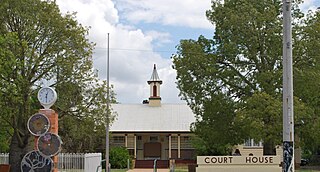
Gayndah Court House is a heritage-listed courthouse at 20 Capper Street, Gayndah, North Burnett Region, Queensland, Australia. It was designed by Queensland Department of Public Works and built in 1928. It was added to the Queensland Heritage Register on 13 January 1995.
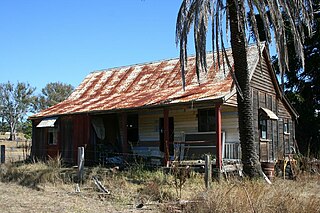
King's Boarding House is a heritage-listed boarding house at Maidenwell-Cooyar Road, Maidenwell, South Burnett Region, Queensland, Australia. It was built in 1889 by John King. It was added to the Queensland Heritage Register on 17 September 2010.
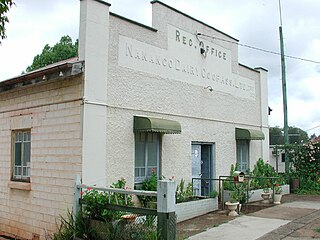
Nanango Butter Factory Building is a heritage-listed factory at George Street, Nanango, South Burnett Region, Queensland, Australia. It was built in 1927. It was added to the Queensland Heritage Register on 3 June 2005.

Tarong Homestead is a heritage-listed homestead at Cooyar Road, Tarong, South Burnett Region, Queensland, Australia. It was built from 1840s to 1890s. It was added to the Queensland Heritage Register on 21 October 1992.

Branyan Road State School is a heritage-listed state school at Branyan Drive, Branyan, Bundaberg, Bundaberg Region, Queensland, Australia. It was designed by Queensland Department of Public Works and built in 1905. It was added to the Queensland Heritage Register on 1 May 2015.
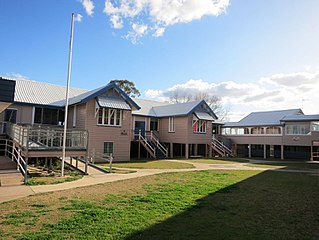
Murgon State School is a heritage-listed state school, pre-school and teacher's residence at 91 Gore Street, Murgon, South Burnett Region, Queensland, Australia. It was designed by Department of Public Works (Queensland) and built from 1914 to 1940. It was also known as Murgon Provisional School and Murgon Rural School. It was added to the Queensland Heritage Register on 9 October 2015.























